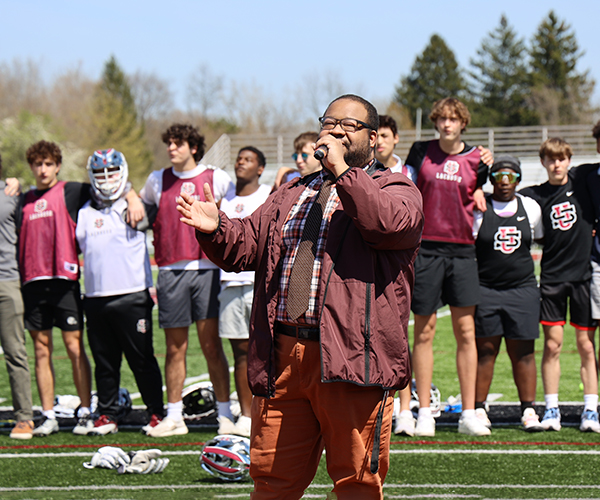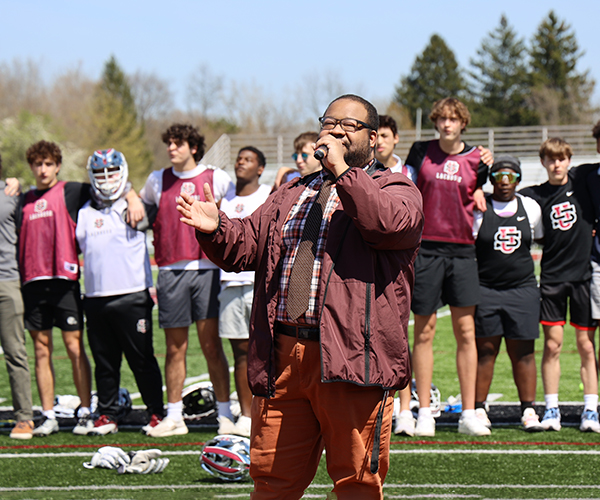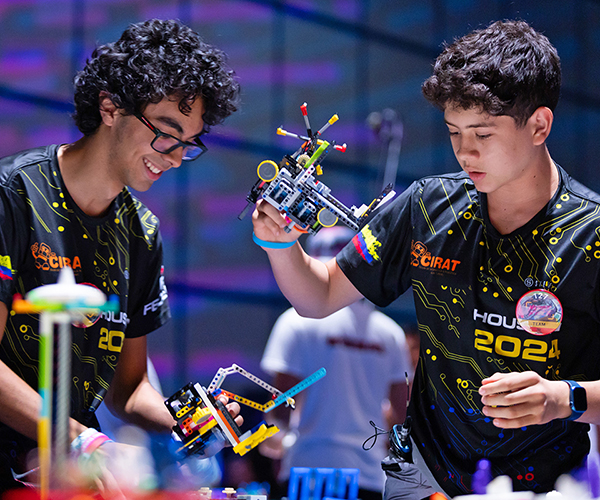"I anticipated some problems with her study habits," Carri says. "And unfortunately, that did come to be a problem."
Samantha's high grades began to drop as she worked to balance the increased demands on her time from extracurricular activities with her class work, and adjust from night-before-the-test studying to a more routine daily review.
"I would study more for what I needed more work in," says the Painesville Township 15-year-old. "But I would say, Oh, I'm good at English,' so I would study less for that."
It took Samantha and her parents and teachers working as a team to find high-school-sized strategies for Samantha's success: adding a study hall period to her schedule, finishing the more difficult math homework first and taking better notes in class.
Now that she's starting 10th grade, Samantha's mom, who's also now her honors English teacher, expects to see those ninth-grade bumps giving way to smoother road. "I saw a lot of growth in her this summer," Carri says. "Ninth and 10th are big growth years. Ninth grade, it's deer-in-the-headlights, but 10th grade you're starting to get the hang of things."
Changes are coming, all parents of eighth-graders know, so how can you prepare? Our panel of teachers, parents and students have some recommendations.
Anybody Have The Time? Here's what high school looks like. Homework will be harder, take longer and include more long-term projects. Tests will roll around more frequently and require ongoing rather than night-before studying. Schedules will include more free time, yet they'll have more possible activities (and distractions) than ever competing for that time.
So what's the single most important skill for navigating the transition to high school? "The biggest thing we talk about is managing your time," says Bill Champ, eighth-grade dean for University School. Every year he organizes a kids-only question-and-answer session so his students can get advice from the freshmen.
"Their message is always to take advantage of [free time during the school day], particularly if you're involved in athletics or clubs," Champ says.
And though it may seem counterintuitive to some parents, now is not the time to insert yourself even more into your child's routine.
"This is a time when kids need to be figuring out those things for themselves," says Sue Sadler, a longtime high school and middle school teacher who is now associate head of school for Hathaway Brown. "You want to put the student in the driver's seat as much as possible."
Hathaway Brown is just one of a growing number of schools that support students' growing independence with one-to-one or small-group adviser or mentor relationships between students and faculty. The role of the adviser goes beyond just class selection and career planning; advisers at HB, US and other schools keep ongoing tabs on a student's academic, social and emotional progress.
"We make sure they're doing OK," Champ says. "[The adviser] does the parent-teacher conference, so they can present a full picture of the student."
All-You-Can-Eat ExtraCurriculars.
From the often limited spread of extracurricular activities available to most middle school kids, your soon-to-be high schooler is headed into a veritable Old Country Buffet of sports and clubs, such as student government and arts groups.
"Ninth grade is the year to experiment," says Laura Walsh, director of the middle and upper schools at Andrews Osborne Academy. "But an adviser will counsel a student if they're becoming stretched too thin."
At the beginning of Maddie Stambler's ninth-grade year at Hathaway Brown last fall, she attended a club fair to learn about the new activities available to her.
"Since I had an older sister, all of her friends wanted me to join their clubs, so I signed up for everything," Stambler recalls. She quickly realized she needed to narrow her choices to a few key interest areas, such as soccer and the school's newspaper.
"Ninth-graders tend to want to be involved in too many things," Walsh says. "They have to learn to prioritize."
Even if they're continuing with longtime activities, they'll likely experience increased competitiveness and time commitment. "In middle school we might practice every day, but in high school we might have a morning and afternoon practice," says Laurel School athletic director Seth Kushkin.
The watchful eye of a faculty adviser or mentor will often catch the signs of an overcommitted, overscheduled student, says Walsh.
"Sometimes we have to sit them down and remind them that academics are the priority," she says.
Facebook And Twitter And Texts, Oh My! In addition to the heavier burdens of homework and extracurriculars, high school schedules often have more unscheduled time with a greater expectation that students use it wisely.
That's a combination that can be disastrous for students hooked on constant texting or social media. "It's almost like a drug," Walsh says. "It takes over what they should be concentrating on in the evenings."
Most schools have policies against using social media sites such as Facebook and Twitter at school, but "as soon as you put up obstacles, they figure out a way around it," Walsh says.
And unless your child's school has banned cell phones outright, the policies and barriers against social media at school are helpless against the phone in her purse.
If you suspect that time spent using technology is distracting your child from academics, schedule a sit-down with your child's adviser. "Faculty can judge how much time they should be spending on homework, so we can walk them through what they do each evening," Walsh says. "It all goes back to communication."
These teachers say the stakes are high: Too much technology inhibits the kind of sustained concentration high school coursework requires.
"Schools are trying to adopt more technology and use more of these attractive features in the classroom," Sadler says. "But you're still looking for sustained ability to think and problem solve in a school, and media really works against that."
Socially Awkward. Take a generous dose of teenage hormones, mix in the stress of a new environment and then combine a shake-up in social structures. Yep, the transition to high school is bound to come with some emotional turmoil.
At Gilmour Academy, beloved middle school math teacher Terri Littlejohn often sees ninth-graders coming back to her math lab asking for advice, help with coursework or just a little moral support.
"Middle school is a place of safety for them," Littlejohn says. "They come back to me because they haven't realized yet that the high school teachers are there to help too."
Many of Northeast Ohio's high schools have programs designed to ease the social and emotional transition for incoming freshmen. For instance, both Laurel School and Hathaway Brown organize a ninth-grade retreat early in the school year devoted to team building, games and other fun activities.
"[The retreat] allows that class to have some tight-knit time together," says Laurel's Kushkin. He's taught and coached in single-sex and coed environments, and says boys are more likely to "go with the flow" while girls often worry about establishing a support network of friends.
"They're not easy years," Walsh says. "Students sometimes stop talking to their parents at that age and think they can figure things out on their own. But parents should continue to try even if you don't get any response."
Loosening The Reins. Sometimes, it's not the students who need the most help adjusting to the high school transition. Walsh says parents often have trouble adjusting to the changes in their kids' lives. If you're the parent who's volunteered in your child's classroom, helped with homework and intervened in difficult situations, now's the time to start increasing your child's independence.
"What we try to do is work with the parents to say, it's really time to allow this natural separation to occur," Walsh says.
Paige Pratt of Shaker Heights has been a stay-at-home mother since her children were young, so her daughters' transition to high school at Hathaway Brown was a bittersweet one. "The biggest and perhaps hardest thing a parent has to do is scale your own involvement back and give them the reins a bit more," she says.
Encourage them to speak up for themselves and seek out the school's resources on their own, and "be there to step in if you have to," Pratt says.
The payoff is a big one, Sadler says. "Their confidence will be greater, and they'll be more willing to take some chances and risks and try some new things, which I think is really important in high school."
Pratt says the feeling of watching your children build independence is one of relief and accomplishment. "As a parent, I feel I'm doing my job," Pratt says. "They can do these things on their own now."
Parent Tips: Organization
- Be an organization role model. Show them your own planner, advises Champ. "They can see it's an important part of life to be organized," he says.
- Ask process questions, such as "Tell me about this paper you're writing" and "How are you progressing on your project?" rather than jumping in to help, suggests Sadler.
Parent Tips: Extracurriculars
- Encourage your child to experiment with new things in ninth grade. "If it takes two years to find out you really like drama, you'll have less time to enjoy that activity," Sadler says.
- Bring your child to the school for sporting events, plays or camps during eighth grade to familiarize them with the options and the school grounds early.
Parent Tips: Texting & the Internet
- Be an "active watcher" of your child's computer time, Walsh says, by keeping it in a common area and checking the screen periodically.
- Friend your child on Facebook as Carri Jackson does to keep a watchful eye out for online bullying.



